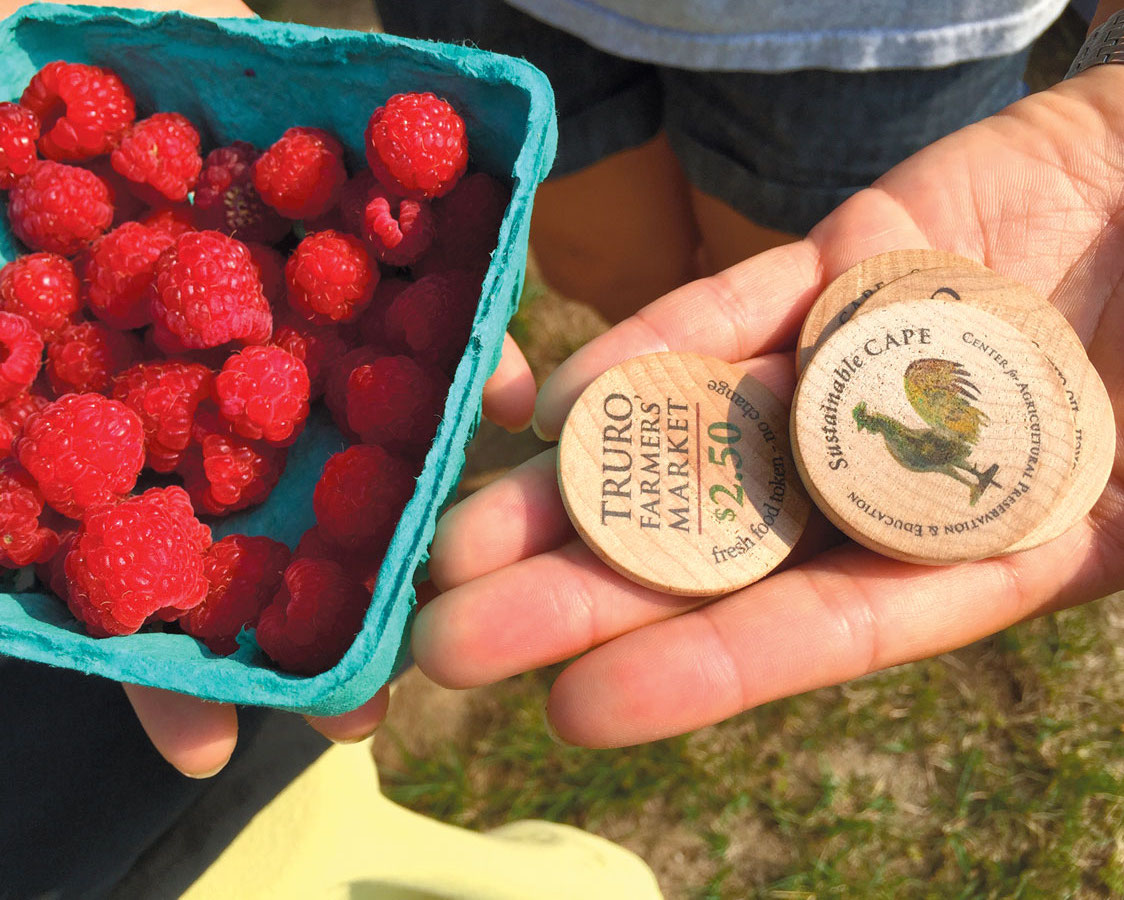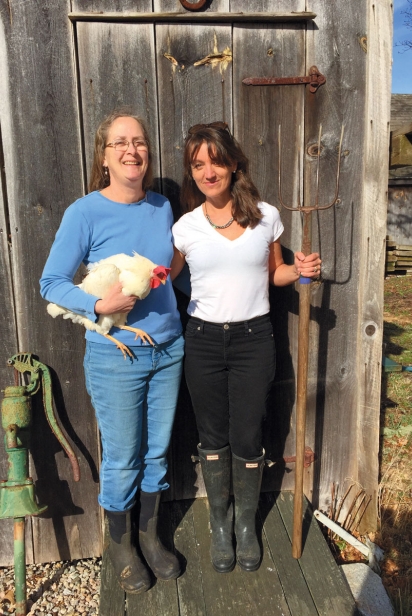Grow, Eat, Share: Local Food for All
Can you double SNAP? The Truro and Orleans Farmers’ Markets can. Not only can they double your SNAP (Supplemental Nutrition Assistance Program) benefits, they can double the value of your WIC (Women, Infants and Children Nutrition Program) and senior market coupons when you use them to shop at these markets. Up to $10 in incentive doubling benefits for each program will be disbursed to participating clients weekly at either or both Cape markets. It wasn’t always so, but thanks to the ceaseless work of Cape Cod food advocates like Gretel Norgeot and Francie Randolph, locally grown food can be a reality for all.
Trying to capture the energy of this pair is a lot like trying to direct a waterfall. As they detail their current mission, new ideas bubble up as they speak, so enthralled are they in connecting the nutritious offerings of local farmers with all Cape Codders. Randolph states, “We want fresh food access for everyone.” Although they arrived at the realization in different ways, both find themselves deeply connected to the Earth and all it can provide. Even more, they both want to share that bounty with others.
Norgeot, a native Cape Codder, says, “I grew up with chickens and learned to grow vegetables rubbing elbows with my grandparents.” With her three young children, Norgeot would establish raised beds in each of the houses they rented. When she and husband Jeff purchased an overgrown eight-and-one-half acre property in South Orleans in 1999, they committed to clearing some land so that gardens, beehives, and sheep could soon find a place on what would become Checkerberry Farm.
“When my oldest daughter, Lee Ann, was in third grade studying embryology, over spring break the newly hatched chicks and ducks needed a home. We agreed [to take them in] and they never left,” says Norgeot. “That year I even got manure on my birthday!”
Randolph’s route to agriculture was more circuitous, admitting that as a teenager growing up in Manchester, Massachusetts, she hated helping out with her family’s vegetable garden, preferring to spend her time sailing or skiing. Later, while a Harvard student pursuing Visual Art and Environmental Studies, Randolph travelled to Papua New Guinea. “It was there that I witnessed subsistence farming, birth, death, marriage, and the slaughter of animals firsthand. I began to see my own relationship to food differently.”
Moving from Cambridge to the Cape, Randolph and her husband Tom Watson settled in a 200-year-old farmstead in Truro. “Tom’s family had lived in Truro for generations,” says Randolph. “We had to rebuild a dilapidated barn that we loved, and in clearing the land, we discovered a decades-old apple orchard. We restored it and now with an antique press, we have cider every fall.”
“I visited and experienced my husband’s family’s two farms in Vermont, and then we also got chickens, but what led most towards me becoming a foodie was my pregnancies,” she adds. “You realize it really is all about what you eat.”
Norgeot says, “Having a permanent home and a family brought me more and more connections. I took my spinning wheel and demonstrated at the Eddy school (in Brewster), and I volunteered at the library. As soon as my kids got on the bus, I was out in the gardens. I could grow a lot for us with more left for the farmers’ market and I connected with the food pantry. The camaraderie was fun and it was something I could do together with my kids.”
Norgeot jumped on the Orleans Farmers’ Market in its infancy in 1995 when it was still located in the Cape Cod Five parking lot, and became its director in 1998.
“My son would bring his Tonka trucks and play in the dirt until someone needed him and his little red wagon to deliver vegetables to their car. My daughters sold zinnias for a quarter.”
Twenty-two years later, the Norgeot family’s presence at farmers’ markets is still growing. Gretel’s mother, Joan Hitchcock, has run a baking business, The Home Bakery and Seaside Garden, for at least eight years at the Orleans market. Daughter Lee Ann Norgeot sells at both the Orleans and Truro markets as Green Bee Gardens, and daughter Marie Weber sells in Wellfleet as Checkerberry Farm. Norgeot continues to lead the Orleans market, and is presently trying to create a related non-profit.
Norgeot has steadfastly been a quiet but bold force in the Cape and Southeastern Massachusetts farming community. She has been involved in lending a generous hand to individuals who have sought her help in initiating Cape farmers’ markets in Chatham, Harwich, Provincetown, Truro, and Wellfleet, and others off-Cape, including two in Plymouth.
In 2009, Randolph focused her experience in the arts and education to help co-found the Truro Ag Fair with two farmer friends, Dave Dewitt and Stephanie Reins. With farm animal displays, a zucchini 500 race, pie eating contests, a local farmers’ market, and food, entertainment, and educational displays, they anticipated 300-500 visitors, but that first year the event debuted at 2500 attendees, and has grown every year since. Soon thereafter, she initiated Sustainable Cape, a nonprofit organization whose mission is to celebrate local food while educating about the health of our bodies, our community, and the environment.
Co-founding the Truro farmers’ market soon followed, with standout educational components including idea boards with kids’ artwork at each vendor’s table highlighting that farmer or producer’s unique sustainable practices that benefit the ecosystem. The Truro market was one of three statewide that were commended and visited last summer by Massachusetts Commissioner of Agricultural Resources John Lebeaux and Massachusetts Commissioner of Transitional Assistance, Jeff McCue. Noted were the market’s mission to foster educational components, non-profit status, and goal of increased food access for all.
Over the years, both Randolph’s and Norgeot’s commitment to educating others about growing, eating, and sharing local fresh food has been unstoppable. Individually or in partnership with others, they have implemented children’s gardens at numerous elementary schools, the Nauset High School, and the Highland Center; increased the donation of local farm produce to food pantries; helped to introduce more local food in our school cafeterias; and initiated numerous educational experiences at libraries, youth centers, and garden clubs, as well as farmer-in-the-school programs.
The pair continue to work together. Grateful for a grant supported by Cape Cod Five, they are collaborating with bank manager Jane Webber to establish a Farmers’ Market Coalition inclusive of all Cape and Island markets. First out is a survey to see exactly how each Cape farmers’ market operates, determine if their market programs can be aligned, and increase universal nutritional incentives to the neediest recipients.
The coalition will be a linking info-hub that will use the experience of more established markets to help other newer markets. “So many people starting out call me about things like writing their initial bylaws,” says Norgeot. “We’re not reinventing the wheel, but streamlining and hand-holding. It’s a free opportunity for all to share in the best practices of running a farmers’ market.”
The goal is to get more markets to participate in programs like WIC and SNAP, and that the coalition, existing as a larger scale organization, would be eligible for more sizeable and far-reaching grants that would help fund programs like benefits doubling. In the past, this has been covered by each market’s own funds, mostly contributed by the farmers’ fees paid to sell at the markets.
In 2011, Wholesome Wave, a nonprofit that seeks to increase access to wholesome foods by implementing novel and nutrition incentive programs, contributed towards the doubling initiatives.
“I am especially proud of the innovative leadership by Gretel and Francie to make fresh, affordable Cape produce accessible to all,” says Wholesome Wave Founding Board Chair, Gus Schumacher. “Their work on nutrition incentives for SNAP, WIC, and seniors at the Truro and Orleans Farmers’ Markets is getting national attention by USDA and within Wholesome Wave’s National Nutrition Incentive Network.” Schumacher, the former USDA Undersecretary for Farm and Foreign Agricultural Services under Clinton, and Massachusetts Commissioner of Food and Agriculture, continues to be a powerhouse in shaping American food policy.
A longtime summer resident of the Cape, Schumacher is optimistic about the number of doctors that are enthusiastic about their these programs. “Health care costs could be lower if individuals consumed more healthful fruits and vegetables.”
The actual percentages of WIC and SNAP doubling for last year, the summer of 2015, was a 75% program utilization increase at the Orleans Market, and a remarkable 550% increase in Truro.
Next up is a convergence of Norgeot and Randolph’s efforts to utilize a $100,000 two-year federal USDA grant, fueling the drive to bring local food to all socioeconomic sectors of Cape Cod. The grant proposal, which occupies a large white binder, took Randolph three months to compose.
“The premise is that everywhere you go you will bump into our mission. It will be spearheaded by a system that is easy for everybody to negotiate. It is about local food and farmers, and nutrition. We can all participate.” Randolph adds, “The community service part is easy, it’s who we all are.”
Outreach for this—the initial year of this two-year grant—has been ongoing and will continue to include nursing homes, councils on aging, affordable housing units, and libraries. Phase one will fund active farmers like Stephanie Reins, whose “Meet the Farmer” programs will extend from Brewster to Provincetown. Phase two, in 2016-2017, will involve deepening relationships between farmers and the local food community.
Posters are spreading the word of the double snapping opportunities at upcoming local farmers’ markets. Forty-seven groups on the Cape, including the Cape Cod Cooperative Extension, are helping to educate about the nutritional incentives and health benefits that farm fresh produce offers.
Statistics on Cape-wide poverty are sobering. The percentage of impoverished children under 18 has multiplied five times in four years, rising from 3.4% in 2006 to 17.8% in 2010, mostly due to the seasonal economy and the high cost of living. Eastham (13.2%) and Wellfleet (16.8%) are two of the worst affected, but sadly are far outpaced by Provincetown (38%).
“Obesity is linked with poor nutrition and income. Seventy percent of disease can be prevented,” says Randolph. “With healthcare costs skyrocketing, it may be much more cost effective overall to support beneficial eating and exercise.”
The hope is that a future relationship can be bridged with health organizations like Outer Cape Health, the Cape Cod Hospital, and Emerald Physicians, to move individuals towards healthier eating, lowering disease rates, and lessening the need for medication.
Education on preparing the fresh seasonal vegetables is already in place by Kim Concra, nutritionist of the Cape Cod Cooperative Extension, and will be expanded to include more farmers’ markets and other locations. Past demos have included cooking, recipes, and produce giveaways. Programs previously implemented for Meals on Wheels will continue, but tweaked with the input of users so that food access and use is maximized.
Another goal is increasing the amount of locally-grown nutrient-dense food in the Cape’s food pantries. A “Grow a Row for Neighbors” campaign is being implemented so that anyone on the Cape can contribute spare produce. Designated pantry drop-off hours will be early in the day with pick-up hours scheduled later, ensuring that food pantry users can access produce without meeting the neighbors who may have grown it. Some farmers’ markets will also serve as an axis for collecting surplus harvests from local gardens, donated produce purchased at the markets and/or cash contributions.
Norgeot smiles, visibly moved when considering the dedicated Cape farmers she knows, whether large-scale or small. “No matter what the weather, when the markets open, they are there, ready for us with all of their produce.”
Randolph, too, pauses at that thought. A good portion of the time she once devoted to making art is now focused on bringing food access to all. “It’s got my heart,” she says.






